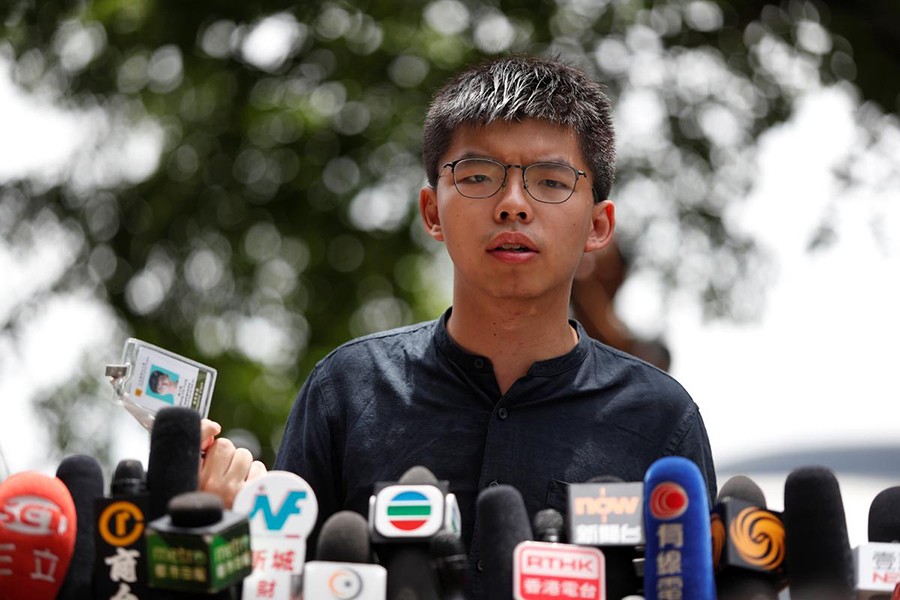Hong Kong pro-democracy activist Joshua Wong was arrested on Friday on suspicion of organising illegal protests as authorities clampdown on a wave of unrest that has plunged the city into its biggest political crisis in more than two decades.
Wong, the icon of pro-democracy demonstrations five years ago that foreshadowed the latest turbulence, is the highest-profile arrest since protests escalated in mid-June over fears Beijing was exerting greater control over the city.
Two other prominent activists, Andy Chan and Agnes Chow, have also been detained.
The bespectacled Wong, who was 17 when he became the face of the student-led Umbrella Movement, has not been a prominent figure in current protests which have no identifiable leaders.
He was released from jail in June after serving a five-week term for contempt of court.
“He was suddenly pushed into a private car on the street,” Wong’s political party Demosisto, which advocates for greater democracy in Hong Kong, said on its official Twitter account.
“He has now been escorted to the police headquarters in Wan Chai,” it said. Demosisto’s lawyers were working on the case, it said.
Police said Wong and Chow, both 22, were arrested on Friday on suspicion of “organizing unorganized assembly” and “knowingly participating in unauthorized assembly”.
Chan, a founder of the pro-independence Hong Kong National Party that was banned last September, was arrested at Hong Kong’s international airport on Thursday on suspicion of “participating in riots” and “attacking police” during a protest on July 13, police said.
Police have refused permission for a pro-democracy march on Saturday and an appeal by organisers to allow the demonstration to proceed was turned down on Friday.
The Civil Human Rights Front, the organizer of previous mass protests, said it would comply with the order and cancel the march from Hong Kong’s central business district to Beijing’s main representative Liaison Office in the city.
More than three months of unrest in Hong Kong was sparked by anger over a now-suspended extradition bill that would have allowed people to be sent to mainland China for trial in Communist Party-controlled courts.
It has evolved into calls for greater democracy under the “one country, two systems” formula, which guarantees freedoms not enjoyed on the mainland that include an independent judiciary, under which Hong Kong has been ruled since 1997.
“Climate Of Fear”
China has accused foreign powers, particularly the United States and Britain, of fomenting the demonstrations in the former British colony and warned against foreign governments interfering in the city’s protests.
A photograph in a pro-Beijing newspaper earlier this month of Wong meeting a US consular official triggered a war of words between Washington and Beijing.
US State Department spokeswoman Morgan Ortagus called China a “thuggish regime” for disclosing photographs and personal details of the diplomat.
Nearly 900 people have been arrested since the demonstrations began with frequent clashes between protesters and police, who have at times fired tear gas and rubber bullets to disperse activists.
China brought fresh troops into Hong Kong on Thursday in what it described as a routine rotation of its garrison there.
Chinese state media stressed the troop movement was routine and Asian and Western diplomats watching the People’s Liberation Army (PLA) forces in the territory had been expecting it.
This weekend marks five years since Beijing ruled out universal suffrage for Hong Kong and comes as the financial hub faces its first recession in a decade, with all its pillars of growth under stress.


